The big debate in global investment markets this year, especially in the Middle East, has been: equities or bonds?
Hugh Briscoe, of Goldman Sachs, is in no doubt as to the answer. Fixed interest investments, especially high-yielding and emerging market bonds, are the "flavour of the month", he says.
You might expect him to say that, as the lead portfolio manager for fixed income focusing on big investors in the Middle East. But Mr Briscoe, a former major in the British army, certainly argues his case with combative confidence.
As ever, the view of Goldman Sachs carries great weight.
The giant American investment bank may have had its share of controversy in recent years: vampire squid; Greek tragedy; and the rest, but the assaults have not so far affected its position as one of the leading investment firms in the world and the one with which most rivals strive to compete. In tough market conditions in the investment banking business, most Goldman executives have simply knuckled down to the job.
Mr Briscoe is a case in point. "I deal with the official institutional investors, governments, sovereign wealth funds, the bigger institutions and also high net-worth individuals," he says.
He appears to be winning them over to his way of thinking on his regular visits to the region every four to six weeks from his London headquarters.
Since 2008, investors have been steering away from low-yielding, underperforming equities and into the apparently more reliable world of fixed interest investments: corporate and sovereign bonds.
"It is a fixed interest environment now," he says. "Global interest rates are low, with a slow but positive economic growth outlook.
"In that environment, you get a migration from equity towards bonds. Global growth would have to improve significantly for a shift back to equities."
The figures seem to confirm that trend, especially in the Middle East. Goldman Sachs Asset Management (Gsam), the fund manager arm of the bank, has some US$715 billion (Dh2.62 trillion) under its control worldwide across different asset classes.
Some 45 per cent of that, about $320bn, is in fixed interest and some 11 per cent in emerging market debt. Gsam manages about $15bn for Middle East investors and it is the fastest-growing part of the business, approximately doubling since the 2008 financial crisis, Mr Briscoe estimates.
While the argument continues as to whether Arabian Gulf equity markets such as the UAE and Qatar should be classed as frontier or emerging, there is no such debate in the bond markets. Regional fixed interest assets are classed in JPMorgan's emerging market indices, in which Gsam invests.
Mr Briscoe's clients in the region are undergoing a change of investment philosophy. "In the past they were often very conservative, happy to be in government bonds in traditional markets but now they are looking for high-yielding opportunities in markets that were previously regarded as risky," he says.
"There is a maturity in emerging markets now that is driving global growth. We are in these markets, in Asia, Africa and the Middle East and South America. We're also in local currency debt in some of these markets as well as in corporate and sovereign debt," he explains.
Gulf bonds have some distinct advantages. "They are usually high-quality issues," he says.
"The Gulf has political stability that gives investors confidence, low levels of leverage and macro-economic stability, too.
"This all adds up to attractive spread premiums, maybe as much as 100 basis points. The developed markets are more expensive and this is often not justified by the creditworthiness." That is the argument for international investors to get involved in Gulf fixed equities, which have been a rising market for the past year with successful issues by government-backed institutions in Dubai, Abu Dhabi and elsewhere.
At the same time, Mr Briscoe believes there has been a significant change in investor attitude among the high net-worth individuals of the region. "They are becoming more sophisticated and less conservative," he says.
"There is a large amount of wealth uninvested in the region that is seeking a safe haven and Asia is more likely to provide that these days. The region is just less sensitive about what was perceived before to be Asian risk."
It all adds up to a greater appetite for local investors to look outside the region, contrary to forecasts that the Arab Spring would prompt a significant round of capital reinvestment in the Gulf and North African economies.
"They are not staying in the region necessarily because, in many cases, they are already significantly invested here," says Mr Briscoe.
The continuing strength of the oil price and signs of a recovery in property are making Gulf investors more confident about external, high-yielding investment, he adds.
[ fkane@thenational.ae ]





